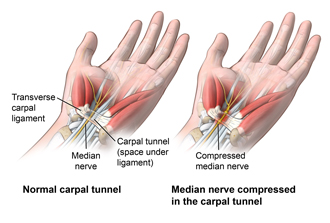
Carpal Tunnel Syndrome
Understanding Carpal Tunnel Syndrome: Symptoms, Causes, and Treatment Options

Introduction
Carpal Tunnel Syndrome (CTS) is a common condition that affects millions of people worldwide. If you're experiencing tingling, numbness, or pain in your hand and wrist, you might be wondering if you have CTS. In this article, we'll explore what carpal tunnel syndrome is, its causes, common symptoms, and available treatment options to help you better understand and manage this condition.
What Is Carpal Tunnel Syndrome?
The carpal tunnel is a narrow passageway located on the palm side of your wrist. It's formed by bones and ligaments and houses the median nerve, which provides sensation to your thumb, index finger, middle finger, and half of your ring finger. When the median nerve gets compressed or pinched within the carpal tunnel, it leads to a condition known as Carpal Tunnel Syndrome.
Common Causes of CTS
- Repetitive Hand Movements: Engaging in activities that involve repetitive hand and wrist movements, such as typing, playing musical instruments, or assembly line work, can increase the risk of CTS.
- Medical Conditions: Certain medical conditions like diabetes, rheumatoid arthritis, and thyroid disorders can make you more susceptible to CTS.
- Pregnancy: Hormonal changes during pregnancy can cause fluid retention and swelling, which may lead to CTS in some women.
- Anatomical Factors: Some individuals have a naturally narrower carpal tunnel, making them more prone to developing CTS.
Recognizing the Symptoms
The symptoms of CTS can vary in intensity but often include:
- Numbness and Tingling: Typically in the thumb, index, middle, and ring fingers.
- Hand Weakness: A weakened grip and difficulty holding onto objects.
- Pain or Discomfort: Pain radiating from the wrist up to the forearm or even into the shoulder.
- Nighttime Symptoms: Symptoms may worsen at night, often causing disturbed sleep.
Diagnosis and Treatment
If you suspect you have CTS, it's important to consult a healthcare professional for a proper diagnosis. They may perform a physical examination, nerve conduction studies, or imaging tests to confirm the condition.
Treatment Options:
-
1. Conservative Approaches:
- Wrist Splints: Wearing a wrist splint can help keep your wrist in a neutral position, relieving pressure on the median nerve, especially at night.
- Activity Modification: Reducing or altering activities that exacerbate symptoms can provide relief.
- Physical Therapy: Targeted exercises can improve wrist and hand strength while reducing symptoms.
-
2. Medications:
- Nonsteroidal Anti-Inflammatory Drugs (NSAIDs): Over-the-counter NSAIDs can help reduce pain and inflammation.
- Corticosteroid Injections: In some cases, a healthcare provider may recommend corticosteroid injections to alleviate symptoms.
-
3. Surgical Options:
- Carpal Tunnel Release Surgery: When conservative treatments fail, a surgeon may perform a procedure to relieve pressure on the median nerve by cutting the ligament that forms the roof of the carpal tunnel.
- Ergonomics: Maintain proper hand and wrist positioning when working or typing.
- Take Breaks: Frequent breaks can help alleviate strain during repetitive tasks.
- Stretching: Regularly stretch your wrists and hands to keep them flexible and reduce tension.
- Maintain a Healthy Weight: Excess weight can contribute to CTS, so maintaining a healthy weight is important.
Preventing Carpal Tunnel Syndrome
Prevention is key, especially if you're at risk due to your occupation or other factors:
Conclusion
Carpal Tunnel Syndrome is a common condition that can affect anyone, but with the right approach, it can be managed effectively. If you suspect you have CTS, don't hesitate to seek medical advice. Early diagnosis and appropriate treatment can significantly improve your quality of life and help you regain full use of your hand and wrist.
Contact Us
Dr. Jawad Khan
Phone: 714-435-9909
Fax: 714-435-9910
8740 Warner Ave
Fountain Valley, CA 92708
Private Insurances Accepted
- PPO
- EPO
- Medicare
- Medicare + Secondary Insurance
- Worker’s Compensation
- Tri-Care PPO